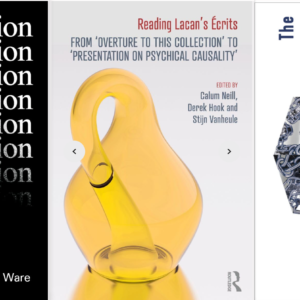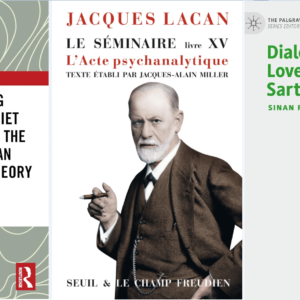News – June 2019
LacanOnline visitors get 20% off and free global shipping on all Routledge titles. Use this link and the discount code on that page at the checkout.
Two new works are soon to arrive from the Palgrave Lacan Series. Firstly, Chenyang Wang’s Subjectivity In-Between Times: Exploring the Notion of Time in Lacan’s Work has been announced for release in late October. Presenting what is the first systematic investigation of how time is conceptualised in Lacan’s work, it looks at how he approached time as “pre-reflectively embodied and symbolically generated” beyond the way it is consciously experienced. Beginning with Lacan’s ‘Logical Time’ paper from the 1940s, Wang goes on to articulate three temporal registers that the author attempts to map to the registers of the real, imaginary and symbolic through which Lacan presents reality.
Secondly as part of the Palgrave Lacan Series, Ed Pluth and Cindy Zeiher’s On Silence: Holding the Voice Hostage will be released at the end of October. It promises to “put silence to work” by exploring the metaphor of silence found in psychoanalysis, philosophy, politics, sociology, psychology, music, and art. It argues that Lacanian psychoanalysis is distinctive for putting a high value on silence, and presents it as a way to deal with the alienation that is constitutive of becoming a speaking-being.
These works sit alongside other recently-released titles in the Palgrave Lacan Series which have been previously mentioned on this site. 2019 titles to date include:
- Yuri Di Liberto’s Being and Contemporary Psychoanalysis: Antinomies of the Object, which proposes a Lacanian reassessment of the definition of the Real and explores how philosophical realisms relate to psychoanalytical conceptions of the Real, and in turn how the Lacanian framework challenges basic philosophical notions of object and reality.
- Duane Rousselle’s Jacques Lacan and American Sociology Be Wary of the Image, which works to disrupt the hold that pragmatist ideology has had over American sociology. The author seeks to recover the tradition of grand theory by bringing psychoanalytical and sociological discourse into fruitful communication with one another.
- Christos Tombras’ Discourse Ontology: Body and the Construction of a World, from Heidegger through Lacan. This book explores the themes within, and limits of, a dialogue between Martin Heidegger’s philosophy of being and Jacques Lacan’s post-Freudian metapsychology. It argues that a conceptual bridging between the two is possible, and lays the foundations of that bridge.
Palgrave is also currently offering a discount of 30% on all books, ebooks and journals ordered from its site until 7th August. Use the coupon code SUMMER19PAL at checkout.
Released in April was Decolonial Psychoanalysis: Towards Critical Islamophobia Studies by Robert Beshara. It explores the possibility of a genuinely anti-colonial psychology, drawing on postcolonial and decolonial approaches to Islamophobia and Lacanian Discourse Analysis, in particular the Zizekian critique of ideology. It is available to preorder from publishers Routledge or Amazon. Get a 20% discount with the code BSE19 when ordering from the publisher.
A translation of Juan David Nasio’s Psychoanalysis and Repetition: Why Do We Keep Making the Same Mistakes? is due for release from SUNY in July. It argues that unconscious repetition is at the core of psychoanalysis just as it is at the core of subjectivity, so that “we are our past in action”. Primarily concerned with the repetition of unconscious trauma and how it finds expression through fantasy and symptoms, Nasio employs clinical examples as well as reference to Descartes, Spinoza, Pindar, Proust, and Verlaine. The translation, from the French original published in 2012, comes courtesy of David Pettigrew.
A new book announced for release in August by Routledge uses Lacan’s work in a consideration of the teaching profession. Research on Becoming an English Teacher: Through Lacan’s Looking Glass explores the discourses and processes that shape the teaching of English, and other subjects, in schools. It is authored by Tony Brown, Mike Dore, and Chris Hanley, all teachers in either university or secondary schools in Manchester, UK.
Arriving in mid-October will be Esoteric Lacan, a new collection edited by Philipp Valentini and Mahdi Tourage. Offering the first in-depth exploration of occultism, Sufism and the Kabbalistic tradition, it looks at how different discourses of ‘religion’ influenced Lacan’s thinking. Critically examining the European understanding of these texts, it seeks to use Lacan’s work to question how such readings are tied to the drive of capitalism and the “psychological internalisation of the history of colonialism”.
Dan Mills’ Lacan, Foucault, and the Malleable Subject in Early Modern English Utopian Literature has been announced for release in November by Routledge. It counters the existing Marxist scholarship on early modern English utopian literature by looking at the intersections between Lacan and Foucault with a focus on subjectivity in texts of this tradition. Although the author notes that neither thinker was a literary critic, Lacan of course steeped himself in the work of Poe, Joyce, Shakespeare, and Sophocles to develop psychoanalytic ideas, and Mills’ book will argue for the malleability of the utopian subject by using Lacan’s work alongside that of his contemporary, Foucault.
Lastly among new books, Lacanians may be interested in Anne Harrington’s Mind Fixers: Psychiatry’s Troubled Search for the Biology of Mental Illness, which was published in May by Norton. Having received much coverage and positive reviews in the mainstream media, it was also recommended last month by Lacanian analyst Thomas Svolos in his review for the Lacanian Review Online. Harrington’s book is noteworthy for its chronicling of of the rise, fall, and – most recently – rise again of psychoanalytic explanations of mental suffering as a result of “psychiatry’s repeatedly frustrated struggle to understand mental disorder in biomedical terms”.
Among the new articles, James Penney’s paper ‘The Phallus Unveiled: Lacan, Badiou and the Comedic Moment in Genet’s The Balcony‘ was published in the journal Paragraph last month and is available to read in full online. It examines a key moment in the final scene of Jean Genet’s controversial 1956 play, and uses Lacan’s concept to examine “the functioning of ideology in the visible world”.
Among events, the NLS Congress took place in Tel Aviv at the beginning of June on the subject of urgency in analysis, and the opening speech by Bernard Seynhaeve is now available on the NLS’s site here. The School’s attention now turns to the next Congress which will take place in Ghent, Belgium. 2020’s theme has been announced as ‘Interpretation: From Truth to Event’, following the suggestion of Eric Laurent in the concluding remarks to this year’s Congress. NLS President Bernard Seynhaeve’s communique can be read here and the text of Laurent’s presentation is here.
In the US, Lacanian Compass has announced its next Clinical Study Days event for February 21st-23rd 2020 in New York City. The title will be ‘Jouissance, the stuff that dreams are made of’ and the argument can be read via the link above. Special guests will include Angelina Harari, Ève Miller-Rose and María Josefina Sota Fuentes.
The Irish Circle of the NLS has announced its seminar programme for the 2019-2020 academic year. Beginning on 21st September with a talk on art and psychoanalysis, other topics include analytic training, readings of Freud’s case studies, and the annual Study Day in May on the theme of the next NLS Congress (see above).
The London Society of the New Lacanian School will be holding its annual Cartel Study Day on Saturday 5th October, offering an opportunity for members of different cartels to come together and share their work and experience. Proposals for presentations are welcome from anyone who has been in a cartel (see details half way down the page at the link above). Relatedly, the four presentations from the Cartels session of the NLS Congress in Tel Aviv last month are now available through the most recent Cartels Newsletter, 4+one.
Dr Calum Neill, founder and director of Lacan in Scotland, speaks with Kat Zabecka on the latest Edinburgh Film Podcast about the aims and activities of Lacan in Scotland, and the intersection of film and psychoanalysis. The podcast is also available on Apple Podcast.
Radio Lacan has also made available the podcast of Yves Vanderveken’s talk at Lacanian Compass’s event ‘The Unconscious and the Brain: Nothing in Common’. Recorded on 15th March this year, it was part of the events Towards PIPOL 9, and Vanderveken’s talk was titled ‘The Lacanian Unconscious: A No-Brainer’.
Lastly, Lacanians may be interested in the Freud Museum London’s upcoming conference ‘Psychoanalysis, Values and Webs of Power’ on Saturday 28th and Sunday 29th September. The conference will investigate the place of talking therapies in the public understanding of mental health and society, and will boast an impressive line-up of speakers and panellists. For more information and and link to book is on the Museum’s site.
Got news? Get in touch.




Leave a Reply